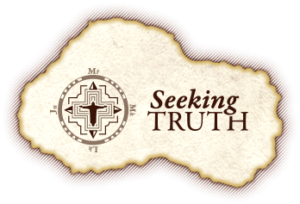Vai offline con l'app Player FM !
ST-Luke Ep 2 – The Gospel of Luke – An Overview Part 2 – Seeking Truth with Sharon Doran – Discerning Hearts Podcast
Manage episode 314167725 series 2064270
Episode 2 – The Gospel of Luke – An Overview Part 2

We begin our study of the Gospel of Luke with an overview lecture, beginning with what we know about the author himself. From the historian, Eusebius, we learn that Luke was a physician from Antioch, an ancient Greek city located in Asia Minor. Antioch was the center of the early Church, and it was here that the followers of Jesus came to be known as “Christians.” Luke, a companion of St. Paul, is responsible for the Gospel of Luke and the Acts of the Apostles, which comprise the greatest percentage of the New Testament.
The word “Gospel” means “Good News” and comes from the Greek word, “euangelion.” During the first century, the fastest growing religion was the imperial cult of Roman emperor worship. The word “euangelion” took on religious significance with the announcement of the “good news” of a new emperor, a new “god.” For Christians, however, the “euangelion” meant the “good news” of the new King of Kings, Jesus Christ.
As a physician, Luke wrote his Gospel to bring the medicine needed for our wounded souls. The new medicine came from the new tree of life, the cross, and the medicine of immortality is the Eucharist. “Every time this mystery is celebrated, “the work of our redemption is carried on” and we “break the one bread that provides the medicine of immortality, the antidote for death, and the food that makes us live forever in Jesus Christ (CCC 1405).”
Through the incarnation, Christ joined in our humanity and introduced His kingdom to the world. As the final High Priest, Jesus completes the perfect sacrifice on the cross. God desires that we cooperate with His plan of salvation, joining in His suffering, to complete “what is still lacking in regard to Christ’s afflictions, for the sake of his body, which is the church (Col 1:24).” “Christ loved the church and gave himself up for her to make her holy, cleansing her by the washing with water through the word, and to present her to himself as a radiant church, without stain or wrinkle or any other blemish, but holy and blameless (Eph 5:25-27).”
Christ has cleansed the Church, making her holy, yet we know that the Church is made up of sinners in need of healing. Jesus, the divine physician, has left us with the healing sacraments of Reconciliation and Anointing of the Sick. What is hidden in shame and secrecy needs to be brought to the light so that healing can take place: “Everyone who does evil hates the light, and will not come into the light for fear that their deeds will be exposed. But whoever lives by the truth comes into the light, so that it may be seen plainly that what they have done has been done in the sight of God (John 3:20-21).”
Further details about St. Luke come from the Church Father St. Hippolytus, a disciple of Irenaeus, who was a disciple of Polycarp who followed St. John the Evangelist. Hippolytus tells us that Luke was one of the 70 disciples mentioned in Luke 10 who were sent out to spread the Good News to the surrounding countries. These 70 were also the same disciples who walked away from Jesus when they could not understand Jesus’ command to eat His flesh and drink His blood (John 6: 66). Later, St. Mark was persuaded back to the fold by St. Peter and it was St. Paul who encouraged Luke to return as a follower of Jesus, and the two became great friends.
As we will learn this year, despite being one of the Synoptics that “see together”, the Gospel of Luke has many unique stories not found in the other Gospels. Luke likely personally interviewed Mary, bringing us the beautiful infancy narratives. The stories behind the Joyful Mysteries of the Rosary, can all be found in the first two chapters of Luke. From Luke, we receive the Canticles of Mary, Zechariah, and Simeon. Only in Luke are found the stories of the Good Samaritan and the Prodigal Son. The Gospel of Luke is the Gospel of joy, mercy and the Holy Spirit.
©2019 Seeking Truth Catholic Bible Study
Sharon Doran serves as the teaching director of “Seeking Truth.” An experienced Bible Study teacher, Sharon has a passion for scripture that will motivate and challenge you to immerse yourself in God’s Word and apply His message to your everyday life.
For more in this series, visit the Seeking Truth with Sharon Doran Discerning Hearts page.
 “Seeking Truth” is an in-depth Catholic Bible Study commissioned by the Archdiocese of Omaha in response to John Paul II’s call to the New Evangelization as well as Pope Benedict XVI’s exhortation for all Catholics to study scripture. To learn more, go to www.seekingtruth.net
“Seeking Truth” is an in-depth Catholic Bible Study commissioned by the Archdiocese of Omaha in response to John Paul II’s call to the New Evangelization as well as Pope Benedict XVI’s exhortation for all Catholics to study scripture. To learn more, go to www.seekingtruth.net
The post ST-Luke Ep 2 – The Gospel of Luke – An Overview Part 2 – Seeking Truth with Sharon Doran – Discerning Hearts Podcast appeared first on Discerning Hearts Catholic Podcasts.
35 episodi
ST-Luke Ep 2 – The Gospel of Luke – An Overview Part 2 – Seeking Truth with Sharon Doran – Discerning Hearts Podcast
Sharon Doran Seeking Truth Catholic Bible Study - Discerning Hearts Catholic Podcasts
Manage episode 314167725 series 2064270
Episode 2 – The Gospel of Luke – An Overview Part 2

We begin our study of the Gospel of Luke with an overview lecture, beginning with what we know about the author himself. From the historian, Eusebius, we learn that Luke was a physician from Antioch, an ancient Greek city located in Asia Minor. Antioch was the center of the early Church, and it was here that the followers of Jesus came to be known as “Christians.” Luke, a companion of St. Paul, is responsible for the Gospel of Luke and the Acts of the Apostles, which comprise the greatest percentage of the New Testament.
The word “Gospel” means “Good News” and comes from the Greek word, “euangelion.” During the first century, the fastest growing religion was the imperial cult of Roman emperor worship. The word “euangelion” took on religious significance with the announcement of the “good news” of a new emperor, a new “god.” For Christians, however, the “euangelion” meant the “good news” of the new King of Kings, Jesus Christ.
As a physician, Luke wrote his Gospel to bring the medicine needed for our wounded souls. The new medicine came from the new tree of life, the cross, and the medicine of immortality is the Eucharist. “Every time this mystery is celebrated, “the work of our redemption is carried on” and we “break the one bread that provides the medicine of immortality, the antidote for death, and the food that makes us live forever in Jesus Christ (CCC 1405).”
Through the incarnation, Christ joined in our humanity and introduced His kingdom to the world. As the final High Priest, Jesus completes the perfect sacrifice on the cross. God desires that we cooperate with His plan of salvation, joining in His suffering, to complete “what is still lacking in regard to Christ’s afflictions, for the sake of his body, which is the church (Col 1:24).” “Christ loved the church and gave himself up for her to make her holy, cleansing her by the washing with water through the word, and to present her to himself as a radiant church, without stain or wrinkle or any other blemish, but holy and blameless (Eph 5:25-27).”
Christ has cleansed the Church, making her holy, yet we know that the Church is made up of sinners in need of healing. Jesus, the divine physician, has left us with the healing sacraments of Reconciliation and Anointing of the Sick. What is hidden in shame and secrecy needs to be brought to the light so that healing can take place: “Everyone who does evil hates the light, and will not come into the light for fear that their deeds will be exposed. But whoever lives by the truth comes into the light, so that it may be seen plainly that what they have done has been done in the sight of God (John 3:20-21).”
Further details about St. Luke come from the Church Father St. Hippolytus, a disciple of Irenaeus, who was a disciple of Polycarp who followed St. John the Evangelist. Hippolytus tells us that Luke was one of the 70 disciples mentioned in Luke 10 who were sent out to spread the Good News to the surrounding countries. These 70 were also the same disciples who walked away from Jesus when they could not understand Jesus’ command to eat His flesh and drink His blood (John 6: 66). Later, St. Mark was persuaded back to the fold by St. Peter and it was St. Paul who encouraged Luke to return as a follower of Jesus, and the two became great friends.
As we will learn this year, despite being one of the Synoptics that “see together”, the Gospel of Luke has many unique stories not found in the other Gospels. Luke likely personally interviewed Mary, bringing us the beautiful infancy narratives. The stories behind the Joyful Mysteries of the Rosary, can all be found in the first two chapters of Luke. From Luke, we receive the Canticles of Mary, Zechariah, and Simeon. Only in Luke are found the stories of the Good Samaritan and the Prodigal Son. The Gospel of Luke is the Gospel of joy, mercy and the Holy Spirit.
©2019 Seeking Truth Catholic Bible Study
Sharon Doran serves as the teaching director of “Seeking Truth.” An experienced Bible Study teacher, Sharon has a passion for scripture that will motivate and challenge you to immerse yourself in God’s Word and apply His message to your everyday life.
For more in this series, visit the Seeking Truth with Sharon Doran Discerning Hearts page.
 “Seeking Truth” is an in-depth Catholic Bible Study commissioned by the Archdiocese of Omaha in response to John Paul II’s call to the New Evangelization as well as Pope Benedict XVI’s exhortation for all Catholics to study scripture. To learn more, go to www.seekingtruth.net
“Seeking Truth” is an in-depth Catholic Bible Study commissioned by the Archdiocese of Omaha in response to John Paul II’s call to the New Evangelization as well as Pope Benedict XVI’s exhortation for all Catholics to study scripture. To learn more, go to www.seekingtruth.net
The post ST-Luke Ep 2 – The Gospel of Luke – An Overview Part 2 – Seeking Truth with Sharon Doran – Discerning Hearts Podcast appeared first on Discerning Hearts Catholic Podcasts.
35 episodi
Todos os episódios
×Benvenuto su Player FM!
Player FM ricerca sul web podcast di alta qualità che tu possa goderti adesso. È la migliore app di podcast e funziona su Android, iPhone e web. Registrati per sincronizzare le iscrizioni su tutti i tuoi dispositivi.




